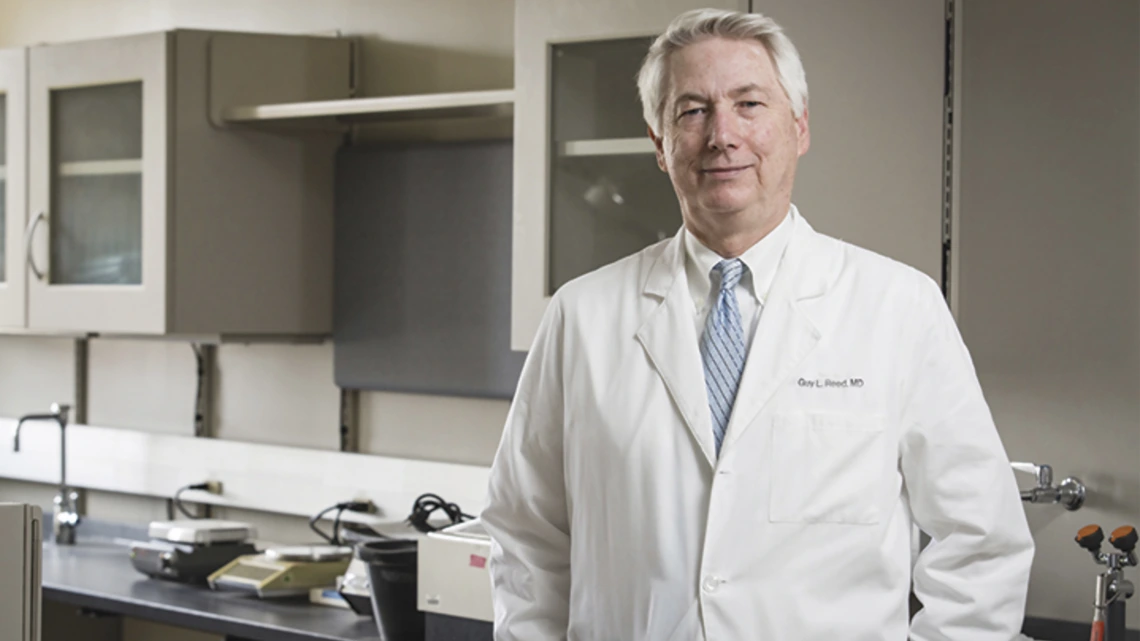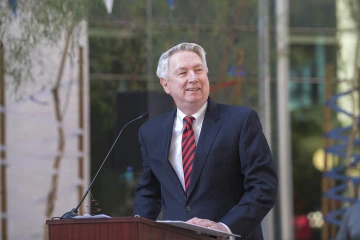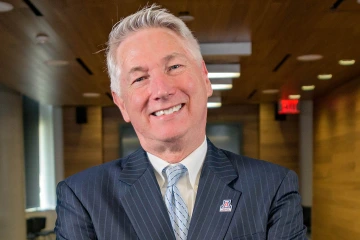Connecting With Dean Reed: Leading a Capital City Med School
Continuous growth and improvement, adaptation and diversification are helping to build a unique alternative at the College of Medicine – Phoenix.

UArizona College of Medicine – Phoenix Dean Guy Reed, MD, says that having a basis in the humanities can make medical students better physicians.
College of Medicine – Phoenix Dean Guy Reed, MD, MS, came to the University of Arizona Health Sciences in 2017. As befits its setting in Arizona’s largest city, the college trains medical students in collaboration with nine clinical partners, including Banner – University Medical Center Phoenix and the Phoenix Veterans Administration. This model involves the most outside partnerships at Health Sciences.

College of Medicine – Phoenix Dean Guy Reed, MD, speaks to the gathered crowd at the Phoenix Bioscience Core before the 2022 Residency Match Day event on March 18, 2022.
Managing those partnerships, dealing with the unique setting and growth of the downtown Phoenix Bioscience Core, and educating and training medical students through a global pandemic highlight his tenure in Phoenix.
The two years of the pandemic have been difficult for everyone. What have they shown you?
We could probably spend all day talking and musing together about this. One lesson is top of mind. Although we can do many aspects of our work virtually, we need social contact with each other to do our best, most meaningful and most impactful work. Personal contact gives us meaning, purpose and cohesion. Young physicians require irreplaceable, in-person training that is essential for them to become astute diagnosticians and healers. So much of the information necessary to make patients better comes from non-verbal communication and other nuances that help us to understand and treat the patient’s illness and associated ‘dis-ease.’
Staff and faculty in the college have described you as an ally for women’s advancement and equity. What do you do to achieve that recognition?

Dean Guy Reed, MD
If you could talk to yourself at your medical school orientation, what advice would you share, after a successful career as a cardiologist, professor and dean?
I'd probably say two things: 1). Seek and accept criticism as a gift to make you and your work better. 2). In areas that don’t involve patient care (where safety is paramount), take more risks in your science and career, and accept failure as a way to learn and grow.
Your undergraduate degree is in English literature. How did that prepare you?
I think it helped me to understand human motivation, striving, anxieties and passion. If it had only given me the power of deathless prose!
What advice would you give to students who follow a similar path?
While science is the epistemological basis for medicine, the humanities and literature provide insight and empathy about the human condition that can help you to become a better physician, a more effective team member and a better leader.
What challenges will you be focused on throughout the next year?
We are continuing to execute our Strategic Plan, which focuses on growing and achieving distinction in innovative personalized education for our students, developing outstanding translational research that leads to tangible products that improve health, developing clinical programs of distinction, and making real progress in the areas of diversity, equity and inclusion. We are fortunate that the Flinn Foundation, among others, has generously committed to helping us to achieve several aspects of that plan.
As the Phoenix Bioscience Core (PBC) continues to grow, what do you envision the College of Medicine – Phoenix's role to be?
The college will continue to collaborate with our partners to achieve success in our missions. For example, through development of our scientific assets, and partnerships with the university, Tech Launch Arizona, the College of Pharmacy, Arizona State University, Northern Arizona University, the Translational Genomics Research Institute (TGen) and clinical partners, we can develop an entrepreneurial ecosystem on the PBC that will drive the translational discoveries made in our labs. By building our capacity for follow-through research and development, we can develop tangible products to improve health. This effort also will bring jobs, talent and revenue to enhance the economy.
How do you differentiate the College of Medicine – Phoenix from the College of Medicine – Tucson?
We have so much in common with our older sibling – we share a great university and a remarkable clinical partner in Banner Health. We share common missions of service to Arizona and we collaborate in many, many areas. Nevertheless, as the French say about their wines, the terroir, or special characteristics of place and region, determines the unique quality of the wine. There are unique circumstances in our two medical schools in different cities and environments that have contributed to and will continue to influence the unique aspects and trajectories of our two schools.
What do you envision the college and Phoenix Bioscience Core campus to look like in five years?
The PBC will have several new buildings to accommodate a robust research enterprise including the new Center for Advanced Molecular and Immunological Therapies being developed by Health Sciences Senior Vice President Dr. Michael Dake. There will be additional university degree programs here, such as engineering and others. There will be several new startups and strong, frictionless collaborations among the state universities.
When the people in Phoenix or across Arizona think of the College of Medicine – Phoenix, what do you want their perception to be?
We want them to know that our college has trained the outstanding physicians that cured them and relieved their suffering; we developed innovations that made them healthier and that moved the economy forward in the biotech and health tech area; and, importantly, we worked together with them to make our community more inclusive and equitable for all.

